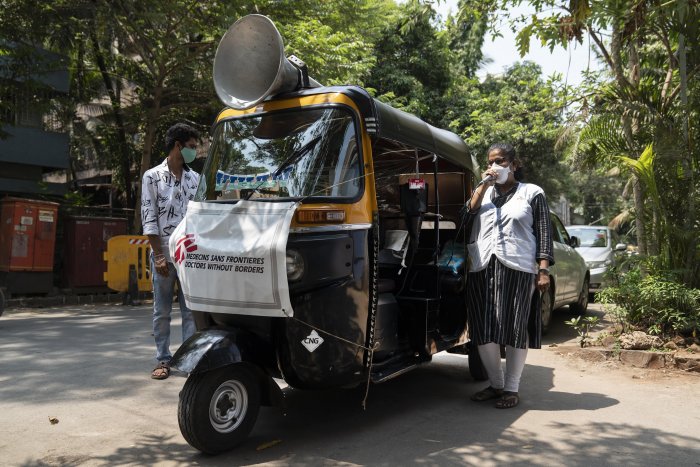
Doctors Without Borders/Médecins Sans Frontières (MSF) is responding to the crisis in Mumbai, the capital of western India’s Maharashtra state. Our teams are treating COVID-19 patients in a massive 2,000 bed facility set up by the Indian government, in addition to ensuring that people living with illnesses like tuberculosis (TB) continue to receive care. Here, MSF team members describe what they’re seeing on the ground.
The situation in India and in Mumbai is very bad. It’s critical across the country. There are many, many cases and the last week of April has seen a real increase. The health workers are overwhelmed and exhausted. There is so much work to do.
The authorities here are well organized and are adapting to the situation as it evolves as best they can. But as the cases increase, it’s getting harder to find beds. They’re calling from hospital to hospital trying to refer patients, but they’re struggling.
We’re doing a lot of work at the community level and are focused on vulnerable people and people with chronic health conditions.
The situation is terrible, but the commitment and the dedication of the staff is extraordinary. There is a very strong feeling of solidarity in the team. People are so committed to helping the patients. Some of them worked with us in our first COVID intervention here in India during the first wave. As soon as we called them, they immediately came and joined us. That was a real boost for us. There are so many more cases now that the staff we have aren’t enough. We still need to recruit more.
No one was ready for the second wave. It caught everybody by surprise. In a very short time, it’s turned into a major crisis. It’s so much worse this time and it was so sudden. MSF had concluded its support to the COVID center in Mumbai in mid-February, as we had hardly any cases. But we kept the community activities going and kept in contact with the people who had worked with us the first time.
We’re doing a lot of work at the community level and are focused on vulnerable people and people with chronic health conditions. People’s living conditions are very challenging. How do you talk about isolation or social distancing when you have a whole family of eight people living in one room with no ventilation? How do you talk about the need to wash hands regularly when so many people have no easy access to water? How do you institute preventative measures in a situation like that? A lot of the key messages about avoiding transmission just don’t work in these situations.
Source:MSF